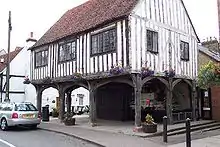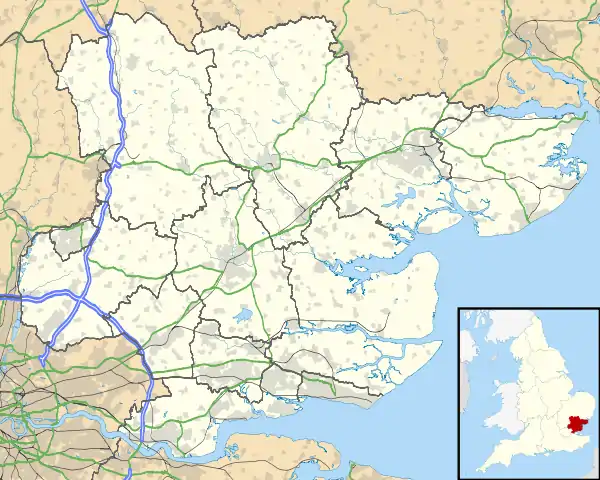Horndon-on-the-Hill
Horndon-on-the-Hill is a village and Church of England parish in the unitary authority of Thurrock, in the county of Essex, England. It is located close to the A13, around one mile northwest of Stanford-le-Hope and around two miles northeast of Orsett. The village area falls within the Orsett ward of Thurrock District Council. In 2019 it had an estimated population of 1517.[1]

| Horndon-on-the-Hill | |
|---|---|
 Horndon-on-the-Hill Location within Essex | |
| Area | 0.672 km2 (0.259 sq mi) |
| Population | 1,517 (2019 estimate) |
| • Density | 2,257/km2 (5,850/sq mi) |
| OS grid reference | TQ665835 |
| Unitary authority | |
| Ceremonial county | |
| Region | |
| Country | England |
| Sovereign state | United Kingdom |
| Post town | STANFORD-LE-HOPE |
| Postcode district | SS17 |
| Dialling code | 01375 |
| Police | Essex |
| Fire | Essex |
| Ambulance | East of England |
| UK Parliament | |
Horndon-on-the-Hill has one church, the Church of St Peter and St Paul, which dates from the 13th century and is Grade I listed.[2] It also has a primary school, a recreational park and two public houses, The Swan and The Bell.
History
Horndon-on-the-Hill appears in the Domesday Book of 1086 as Horninduna, meaning "horn-shaped hill".[3] It may have been the site of the 11th-century Horndon mint, based on the survival of a single Anglo-Saxon penny from the village.
In the late 15th century, the lord of the manors of Arden Hall and Horndon House was Sir Edmund Shaa. Shaa was a supporter of Richard III and was knighted by him. These manors remained in the Shaa family for several generations before passing to the Pooley family.
A woolmarket was established in the village in the early 16th century; the building later became a shelter for the poor people of the area.[4]
On the south wall of the church is a memorial to Thomas Higbed, who was burned at the stake in Horndon in 1555 and is included in Foxe's Book of Martyrs.[5]
Horndon-on-the-Hill is one of the seven conservation areas of Thurrock and was the first of the seven to be designated, in September 1969.[6]
Since the 13th century, Horndon-on-the-Hill hosts the annual "Feast and Fayre" on the last weekend in June.[7]
Prominent residents have included Sir John Tusa, journalist and broadcaster and former President of Wolfson College, Cambridge.
Governance
Horndon-on-the-Hill belonged to the Barstable hundred of Essex, before becoming part of Orsett Rural District in 1894 and then part of Thurrock Urban District in 1936. In 1974, the urban district became the Borough of Thurrock under the Local Government Act 1972. The borough was given administrative independence from Essex County Council in 1998.
References
- "Horndon on the Hill". City Population De. Retrieved 19 November 2020.
- "St Peter and St Paul, Horndon-on-the-Hill". Thurrock Local History Society. Retrieved 28 March 2014.
- Mills, A.D., A Dictionary of British Place Names (Oxford University Press, 2011). ISBN 978-0-1996-0908-6
- "The Horndon Woolmarket". Thurrock Council. Retrieved 28 March 2014.
- Christopher Harrold, Exploring Thurrock (Thurrock Local History Society, 2008)
- "Conservation Areas in Thurrock". Thurrock Council. Retrieved 28 March 2014.
- "www.horndon-feastandfayre.co.uk". www.peterjane.co.uk. Retrieved 1 August 2018.
External links
![]() Media related to Horndon on the Hill at Wikimedia Commons
Media related to Horndon on the Hill at Wikimedia Commons